Financial System Adaptability and Resilience
Financial systems differ across countries and tend to evolve slowly over time. Their structure is typically stable, but their resilience is often tested. A well-functioning financial system is vital for economic development, as it ensures that capital flows to the most productive and valuable investment opportunities. However, systemic vulnerabilities can have far-reaching consequences. For example, the 2007–08 global financial crisis emerged from within the financial sector itself when complex financial products fuelled a credit bubble in the U.S. housing market, threatening global economic stability when the bubble burst. That event led to extensive policy and regulatory reforms to strengthen financial system resilience.
Financial systems continue to face significant challenges. External shocks like the COVID-19 pandemic, the climate crisis, the green economic transition, and the energy crisis driven by geopolitical conflict all underscore the importance of financial systems that can absorb shocks and adapt to changing economic conditions. Motivated by these pressing issues, we investigate how financial systems respond to crises, which institutions and policies improve resilience, and the role of finance systems' setup in broader economic transformations. We use diverse data sources, including bank and firm-level data, regulatory reports, and house price and election data, to inform evidence-based policy.
Research Cluster
Financial Resilience and RegulationYour contact

- Department Financial Markets
EXTERNAL FUNDING
08.2022 ‐ 07.2025
OVERHANG: Debt overhang and green investments - the role of banks in climate-friendly management of emission-intensive fixed assets
The collaborative project “Debt Overhang and Green Investments” (OVERHANG) aims to investigate the role of banks in the climate-friendly management of emission-intensive fixed assets. This will identify policy-relevant insights on financial regulation, government-controlled lending and financial stability, as well as raise awareness among indebted stakeholders.
01.2015 ‐ 12.2019
Interactions between Bank-specific Risk and Macroeconomic Performance
07.2016 ‐ 12.2018
Relationship Lenders and Unorthodox Monetary Policy: Investment, Employment, and Resource Reallocation Effects
Leibniz Association
We combine a number of unique and proprietary data sources to measure the impact of relationship lenders and unconventional monetary policy during and after the European sovereign debt crisis on the real economy. Establishing systematic links between different research data centers (Forschungsdatenzentren, FDZ) and central banks with detailed micro-level information on both financial and real activity is the stand-alone proposition of our proposal. The main objective is to permit the identification of causal effects, or their absence, regarding which policies were conducive to mitigate financial shocks and stimulate real economic activities, such as employment, investment, or the closure of plants.
Refereed Publications

Commitment or Constraint? The Effect of Loan Covenants on Merger and Acquisition Activity
in: Finance Research Letters, June 2022
Abstract
We investigate how loan covenants associated with potential target firms affect takeover deals. We propose two possible channels. Under a discipline channel, the target firm becomes an attractive candidate for takeovers and merger deals are facilitated. Under a constraint channel, covenants hinder merger activity. We find support for the latter channel. Takeover likelihood is lower, deal failures are more common, the likelihood of price renegotiation is higher, and acquisition premium is lower when the target is bound by covenants. Covenant tightness exacerbates this effect.

Political Ties and Raising Capital in Global Markets: Evidence from Yankee Bonds
in: Journal of Corporate Finance, June 2022
Abstract
This paper examines whether state-to-state political ties help firms obtain better terms when raising funds in global capital markets. Focusing on the Yankee bonds market, we find that issuances by firms from countries with close political ties with the US feature lower yield spreads, higher issuance amounts, and longer maturities. Such an association is more pronounced for firms located in low income and highly indebted countries as well as firms in government-related industries, first-time issuers, and relatively smaller firms. Our study provides evidence supporting the notion that country-level political relationship is an important factor when raising capital in international markets.
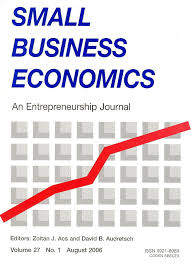
Bank Failures, Local Business Dynamics, and Government Policy
in: Small Business Economics, No. 4, 2022
Abstract
Using MSA-level data over 1994–2014, we study the effect of bank failures on local business dynamics, in the form of net business formation and net job creation. We find that at least one bank failure in the metropolitan statistical area (MSA) with the mean population prevents approximately 475 net businesses from forming in that area, compared with MSAs that experience no bank failures, ceteris paribus. The equivalent effect on net job creation is 16,433 net job losses. Our results are even stronger for small businesses, which are usually more dependent on bank-firm relationships. These effects point to significant welfare losses stemming from bank failures, highlighting an important role for government intervention. We show that the Troubled Asset Relief Program (TARP) is effective in reducing the negative effects of bank failures on local business dynamics. This positive effect of TARP is quite uniform across small and large firms.
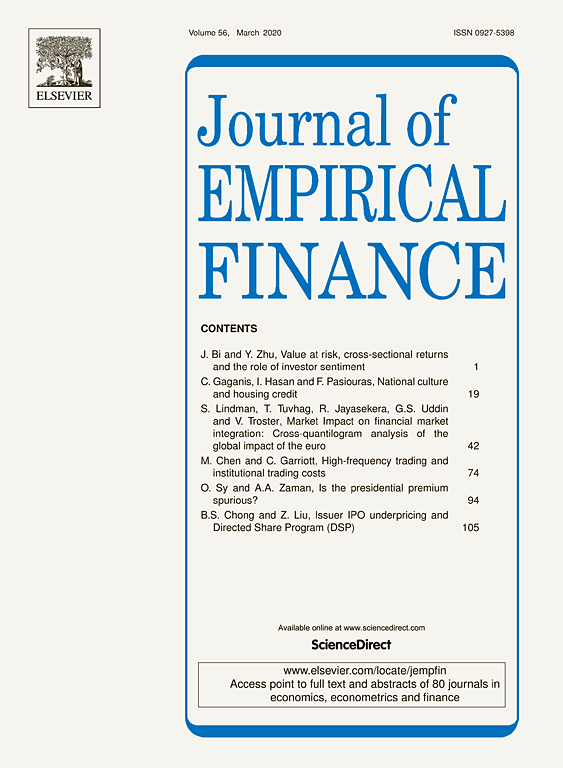
Income, Trading, and Performance: Evidence from Retail Investors
in: Journal of Empirical Finance, March 2022
Abstract
We examine whether household income influences the trading styles of retail investors and their investment performance. To investigate this question, we use a unique dataset of branch-level trading that contains all retail investors and observe that those investors with high income trade more and earn significantly higher returns in the stock market. In addition, this income effect becomes stronger for highly risky stocks, such as gambling or lottery-like stocks. These findings are in line with the information model theorized by Peress (2004) in which wealthy investors take extra risks by trading more stocks.

Banking Reform, Risk-Taking, and Accounting Quality: Evidence from Post-Soviet Transition States
in: Journal of International Accounting Research, No. 1, 2022
Abstract
The drastic banking reform within Central and Eastern Europe following the collapse of the Soviet Union provides an ideal quasi-experimental design to examine the causal effects of institutional development on accounting quality (AQ). We find that banking reform spurs significant improvement in predictive power of earnings and reductions in earnings smoothing, earnings-inflating discretionary provisions, and avoidance of reporting losses. These effects hold under alternative model specifications and after considering concurrent institutional developments. In contrast, corporate reform shows no such effects, refuting the alternative explanation that unobserved factors affect both reform speed in general and the quality of financial reporting. We further identify four specific reformative actions that are integral to the drastic banking reform process where prudential regulation contributes the most to the observed AQ improvement. It supports the conjecture that banking reform improves AQ by reducing banks' risk-taking behaviors and, as a result, their motive behind accounting manipulation.
Working Papers
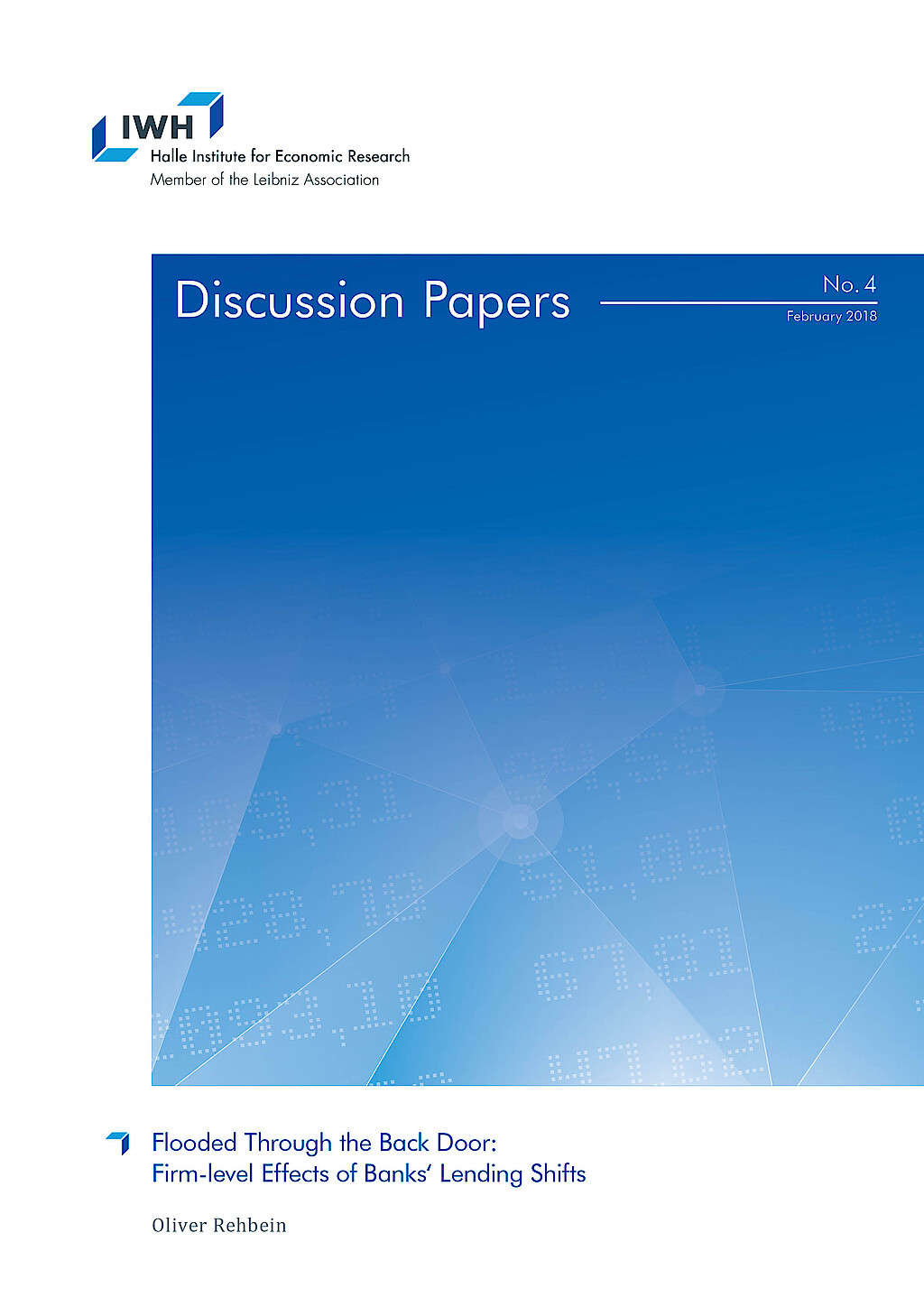
Flooded Through the Back Door: Firm-level Effects of Banks‘ Lending Shifts
in: IWH Discussion Papers, No. 4, 2018
Abstract
I show that natural disasters transmit to firms in non-disaster areas via their banks. This spillover of non-financial shocks through the banking system is stronger for banks with less regulatory capital. Firms connected to a disaster-exposed bank with below median capital reduce their employment by 11% and their fixed assets by 20% compared to firms in the same region without such a bank during the 2013 flooding in Germany. Relationship banking and higher firm capital also mitigate the effects of such negative cross-regional spillovers.
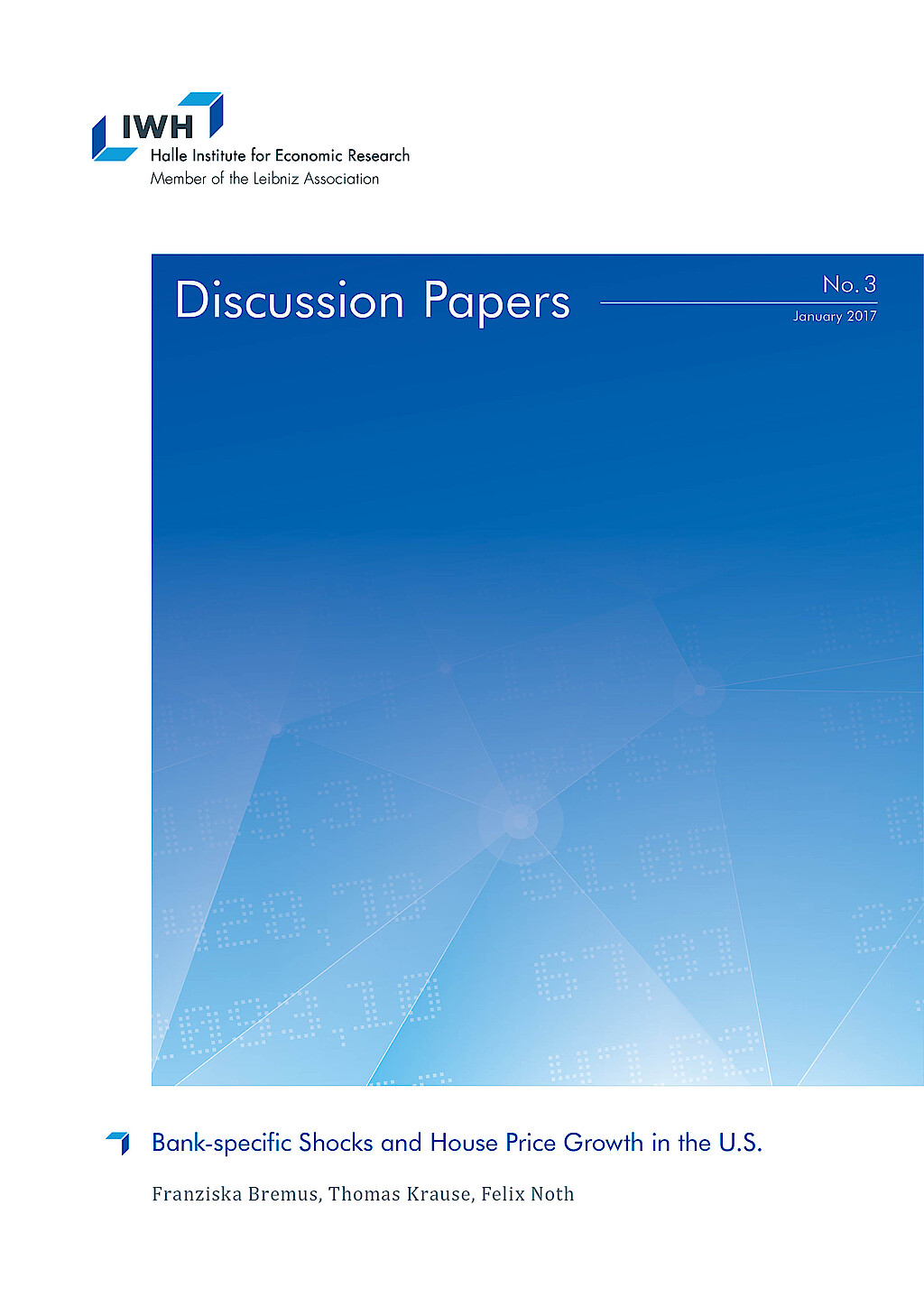
Bank-specific Shocks and House Price Growth in the U.S.
in: IWH Discussion Papers, No. 3, 2017
Abstract
This paper investigates the link between mortgage supply shocks at the banklevel and regional house price growth in the U.S. using micro-level data on mortgage markets from the Home Mortgage Disclosure Act for the 1990-2014 period. Our results suggest that bank-specific mortgage supply shocks indeed affect house price growth at the regional level. The larger the idiosyncratic shocks to newly issued mortgages, the stronger is house price growth. We show that the positive link between idiosyncratic mortgage shocks and regional house price growth is very robust and economically meaningful, however not very persistent since it fades out after two years.
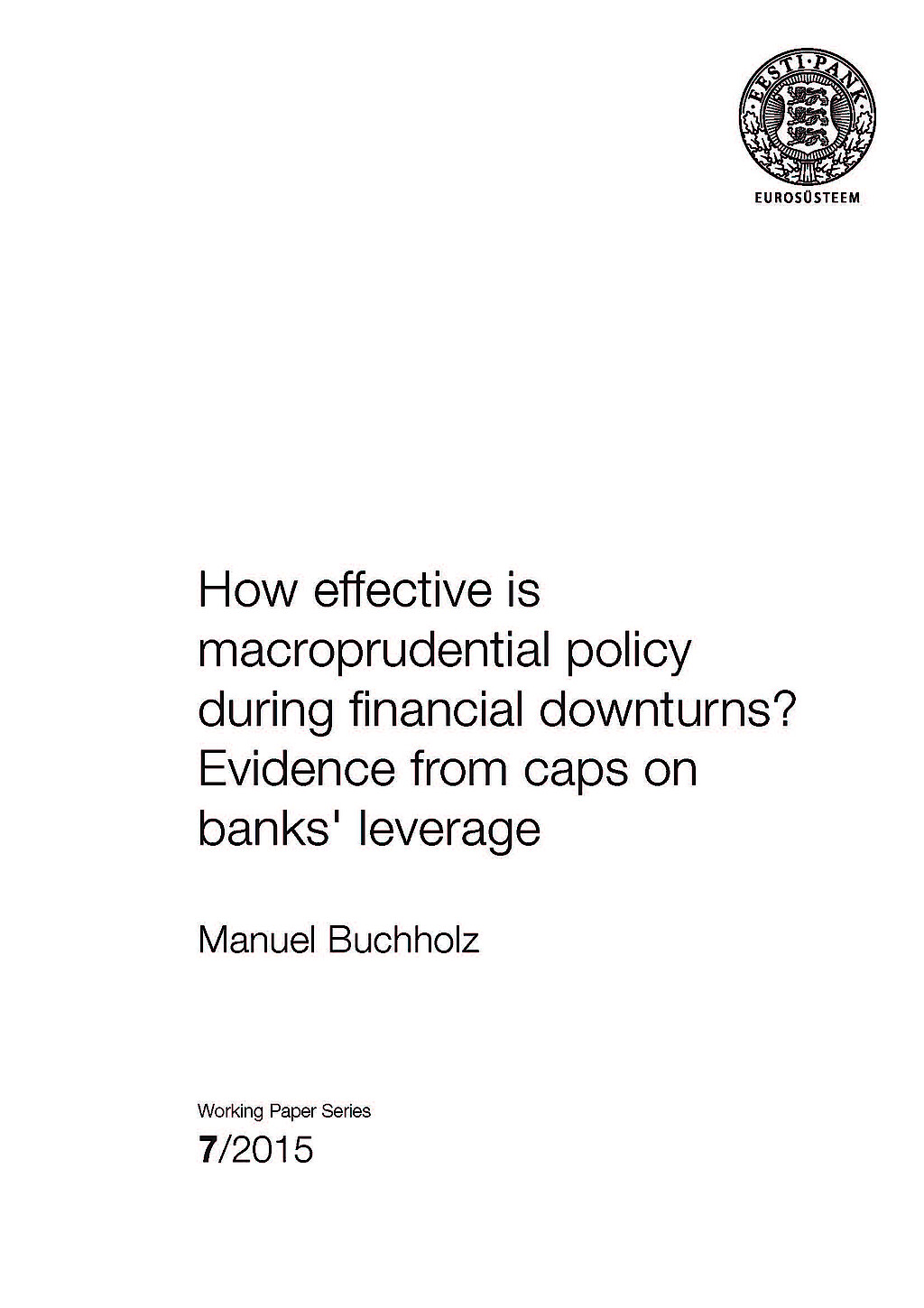
How Effective is Macroprudential Policy during Financial Downturns? Evidence from Caps on Banks' Leverage
in: Working Papers of Eesti Pank, No. 7, 2015
Abstract
This paper investigates the effect of a macroprudential policy instrument, caps on banks' leverage, on domestic credit to the private sector since the Global Financial Crisis. Applying a difference-in-differences approach to a panel of 69 advanced and emerging economies over 2002–2014, we show that real credit grew after the crisis at considerably higher rates in countries which had implemented the leverage cap prior to the crisis. This stabilising effect is more pronounced for countries in which banks had a higher pre-crisis capital ratio, which suggests that after the crisis, banks were able to draw on buffers built up prior to the crisis due to the regulation. The results are robust to different choices of subsamples as well as to competing explanations such as standard adjustment to the pre-crisis credit boom.

Monetary Policy under the Microscope: Intra-bank Transmission of Asset Purchase Programs of the ECB
in: IWH Discussion Papers, No. 9, 2015
Abstract
With a unique loan portfolio maintained by a top-20 universal bank in Germany, this study tests whether unconventional monetary policy by the European Central Bank (ECB) reduced corporate borrowing costs. We decompose corporate lending rates into refinancing costs, as determined by money markets, and markups that the bank is able to charge its customers in regional markets. This decomposition reveals how banks transmit monetary policy within their organizations. To identify policy effects on loan rate components, we exploit the co-existence of eurozone-wide security purchase programs and regional fiscal policies at the district level. ECB purchase programs reduced refinancing costs significantly, even in an economy not specifically targeted for sovereign debt stress relief, but not loan rates themselves. However, asset purchases mitigated those loan price hikes due to additional credit demand stimulated by regional tax policy and enabled the bank to realize larger economic margins.

Corporate Governance Structures and Financial Constraints in Multinational Enterprises – An Analysis in Selected European Transition Economies on the Basis of the IWH FDI Micro Database 2013 –
in: IWH Discussion Papers, No. 3, 2015
Abstract
In our analysis, we consider the distribution of decision power over financing and investment between MNEs’ headquarters and foreign subsidiaries and its influence on the foreign affiliates’ financial restrictions. Our research results show that headquarters of multinational enterprises have not (yet) moved much decision power to their foreign subsidiaries at all. We use data from the IWH FDI Micro Database which contains information on corporate governance structures and financial restrictions of 609 enterprises with a foreign investor in Hungary, Poland, the Czech Republic, Slovakia, Romania and East Germany. We match data from Bureau van Dijk’s AMADEUS database on financial characteristics. We find that a high concentration of decision power within the MNE’s headquarter implicates high financial restrictions within the subsidiary. Square term results show, however, that the effect of financial constraints within the subsidiary decreases and finally turns insignificant when decision power moves from headquarter to subsidiary. Thus, economic policy should encourage foreign investors in the case of foreign acquisition of local enterprises to leave decision power within the enterprise and in the case of Greenfield investment to provide the newly established subsidiaries with as much power over corporate governance structures as possible.



















